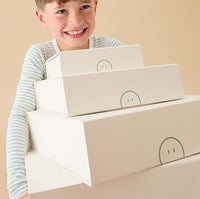Aine Homer, The Baby Reflux Lady, is back with another article about baby reflux.
Helping you to understand three things you shouldn't be doing, and three things you should start doing to help your little one.
What can you do to make life a little bit easier? What should you let go of and what habits can you adopt?
Regardless of what anyone says, reflux does go away, by itself …. eventually. Because it is intrinsically linked to the maturity of your baby’s digestive system: the enzymes they produce at birth are not the same as at 2 years of age; their oesophagus need to grow longer, and the strength of the muscle between the food pipe and their stomach needs to develop. And all of these things will happen…. In due course.
I’m here to tell you that you do not need to simply wait it out, or watch your baby, your own health and your relationships suffer. There are things you can do to directly impact the suffering of your little one.
So what are the things you can start doing, and stop doing right now that will change your life, that will change how you look back on these precious months?
You see, I learned the hard way. I have very little to look back on and smile about. I have to look very hard to remember any enjoyment in being a mum for the first 12 months and more. You can be different… first, I recommend you stop doing 3 things:
1. stop defining your baby by their suffering
You do not have a reflux baby, a refluxer, a dragon, a colicky baby or a CMPA baby (cow’s milk protein allergy), you have a baby with reflux, silent reflux, colic or CMPA. This may seem simple, even ridiculous. But you really do see what you say, and create what you see. Your thoughts are not creating this unsettledness, nor are they helping the resolution.
The link between mothers emotional state and a breastfed baby’s state have been well documented. In fact, a study from 1996 stated “early parental emotional support -- acts of caring, acceptance, and assistance -- proved a principal predictor of mental and physical health in adulthood, associations that persisted into the 7th decade of life”. (Brim et al., 1996).
If you are carrying around a label that defines your baby as a reflux baby, you are defining them as a problem, as a disease. This they are not. By reframing your baby’s suffering as something your baby has rather than something your baby is, will help you find a resolution much quicker, because it does not belong somewhere. It does not have a ‘home’.
2. stop comparing your baby to everyone else's
Your baby is your baby. The condition of comparisonitis is a serious one. Your baby will never be someone else’s baby. If your ante-natal class friends baby’s are all sleeping through the night at 12 weeks (most of mine were so I know the feeling), yes, you can feel a little jealous, and you can feel disappointed that your little one is up a lot during the night. And you may even feel lonely in these wee hours.
But let me tell you this, that the trust that grows between your baby and you when you are there for them, regardless of whether you can take away their pain or not, is priceless. I have the most incredible relationship with both of my babies, both of whom suffered with reflux and CMPA, year later, and I would not swap that for the world. Other people will have their own challenges.
This is not about judging you, or judging them. This is allowing your baby to be your baby, defined by being their own little person.
3. stop doing it all on your own
I know it’s hard. I also know what it’s like to feel like your doctor thinks you’re nothing more than a neurotic first time mum, paranoid and over protective. I know the hurt inside. I know the exhaustion. Someone else, a partner, a grandparent, a friend, can look after your little one for 30 minutes so you can get some respite.
Someone else can cook the food. Someone else can put away the washing up. In the grand scheme of things, does it really matter if the saucepans are in the wrong order or kitchen utensils in the wrong drawer?
now you've stopped these 3 things, here are 3 that will improve your life
1. be honest and vulnerable with your partner. Don’t expect them to be a mind-reader, they are not. Let them in. It is not your job to protect them from worrying about you and your baby. Let them worry. It is not your job to not distract them from their work. Let them be distracted. There are extremely few occurrences when a partner will actually say they would rather their wives hid the truth from them. You do not have to build walls. This is about letting them support you in the way that they signed up to by being your partner.
2. sleep when your baby sleeps. Seriously. Do this. Learn how to have a nap. Up to 60 minutes if your baby lets you.
By doing this for a week or so you can train your body to drop into REM sleep very easily, and importantly, REM sleep is what boost brain functions including memory, and emotions and improve perception. Our Mediterranean cousins nap daily, during siesta time. Why don’t we? As a species, it is normal for us to experience an afternoon slump in energy, this is our bodies saying – rest time! So why fight it?
3. for just 60 seconds everyday, mindfully cherish your baby for the amazing beautiful and magical little human being they are. Take stock of what you have created and feel the love. Consciously create a memory that you love. Take it to the next step by creating a journal of love about your baby and write one wonderful thing you notice about them each day. Then when you look back you will have happy memories to have.
Discover MORI's best sellers. Loved by parents, a collection of our softest baby & toddler essentials crafted in our softest organic fabrics.
SHOP BEST SELLERS




